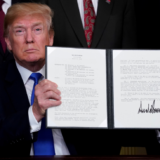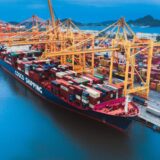Hapag-Lloyd CEO: Trump tariffs could pressure some sectors but won’t derail global trade
noviembre 8, 2024 Global TradeOcean Cargo
As 2024 winds down and 2025 approaches, a wave of uncertainty clouds the horizon, driven by geopolitical tensions, shifting carrier alliances, and impending policy changes. The coming months promise to test the resilience of global supply chains and international relations alike.
The ongoing war between Russia and Ukraine wages on with no clear resolution in sight. Meanwhile, the Red Sea region faces escalating tensions, compounded by the ongoing crisis in Israel and Gaza. In the United States, the transition to a new administration, led by President-elect Donald Trump, adds another layer of uncertainty. With the inauguration scheduled for 20 January 2025, the potential revival of “Trump tariffs” on China (10%), Mexico, and Canada (25%) looms large. Adding to the unease is the risk of labour strikes along the US East and Gulf Coasts as negotiations between unions and shipping lines have broken down over automation and the union is adamant on striking again in January if no deal on a new master contract is reached. This uncertainty is driving shippers to act preemptively, aiming to mitigate potential fallout by stockpiling goods.
“What we see is that people say, let’s bring our cargo in a little bit early. Let’s build up a little bit of buffer in our warehouses, so that our supply chains are safe for all these eventualities,” Jan Tiedemann, Shipping Analyst at Alphaliner said on Tuesday during a virtual panel discussion hosted by Hapag-Lloyd.
No reason to panic
A media frenzy has erupted over the potential impact of Trump tariffs on container shipping and global trade in general, with a particular focus on the effect on consumer prices. Analysts warn that increased costs could filter down to everyday goods, stoking inflationary pressures and further straining household budgets. During his campaign, Trump pledged 60% tariffs on all imports from China and up to 20% on goods from other countries. However, he has since scaled back these proposals to 10% and 25% tariffs, easing some initial concerns. While uncertainty remains on what will the official policy be, industry leaders believe there is no room for panic.
“In the long run, of course, if Trump raises tariffs, that’s never good for trade. However, at the same time, ironically, I believe that on the big trades, like Asia- USA, for example, the tariffs will have a fairly limited effect, because, at the end of the day, it’s still cheaper to produce in China than to produce in the US. The factories are not magically moving to the US, while some might be moving to Mexico. But it’s not going to structurally change the nature of the trade. So in the short term, I think the effects on trade will be quite limited,” Tiedemann added.
Mads Drejer from Denmark-based Scan Global Logistics agrees, arguing that the idea of nearshoring — shifting production closer to home — is not realistic on a large scale because there simply isn’t enough available labour to support such a move. He believes the impact of potential trade wars or tariff changes may be less severe than often speculated. Drawing from history, Drejer noted that similar trade disruptions in the past, like those in 1819 (Panic of 1819), had mild economic effects, with potential short-term impacts as low as 0.2% on the US economy. He also pointed out that factors like tax cuts and decreasing inflation could counterbalance any negative impacts, potentially boosting consumer spending.
Drejer emphasised that while the media might stir panic, most businesses and customers remain calm and pragmatic, opting to monitor the situation rather than react impulsively.
The tariffs will have a limited effect
Rolf Habben Jensen, CEO of Hapag-Lloyd, shared a cautious yet optimistic outlook, suggesting that while the incoming administration in the US should be watched closely, the impact of potential changes may not be as severe as some expect. Drawing on Trump’s first term as president, he noted that the economic effects were relatively mild. Jansen mentioned that while there might be a surge in activity before the Chinese New Year and current volumes are still robust, the true impact will only become clear later.
“In the end, we also shouldn’t forget that the biggest thing Trump will try to do is boost the US economy. And if he boosts the US economy, that will mean more demand, and quite a lot of that is going to come from overseas. As such, I don’t think we will see a collapse of global trade,” Jansen said.
However, Jansen acknowledged that certain sectors, like European automotive and chemicals, may face more pressure. Despite this, he noted that cargo flows from Asia remain steady, and many industry stakeholders, including those he spoke to in the US and China recently, are staying calm and practical as the full picture is still unfolding.






Recent Comments